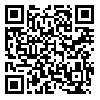Fri, Feb 20, 2026
[Archive]
Volume 32, Issue 1 (2-2018)
Med J Islam Repub Iran 2018 |
Back to browse issues page
Download citation:
BibTeX | RIS | EndNote | Medlars | ProCite | Reference Manager | RefWorks
Send citation to:



BibTeX | RIS | EndNote | Medlars | ProCite | Reference Manager | RefWorks
Send citation to:
Rabiee A, Vasaghi-Gharamaleki B, Samadi S A, Amiri-Shavaki Y, Alaghband-rad J, Seyedind S et al . Impaired nonverbal working memory in high-functioning autism spectrum disorder . Med J Islam Repub Iran 2018; 32 (1) :623-629
URL: http://mjiri.iums.ac.ir/article-1-5350-en.html
URL: http://mjiri.iums.ac.ir/article-1-5350-en.html
Atusa Rabiee 

 , Behnoosh Vasaghi-Gharamaleki
, Behnoosh Vasaghi-Gharamaleki 

 , Sayyed Ali Samadi
, Sayyed Ali Samadi 

 , Younes Amiri-Shavaki
, Younes Amiri-Shavaki 

 , Javad Alaghband-rad
, Javad Alaghband-rad 

 , Saba Seyedind
, Saba Seyedind 

 , Soode Hosseini
, Soode Hosseini 




 , Behnoosh Vasaghi-Gharamaleki
, Behnoosh Vasaghi-Gharamaleki 

 , Sayyed Ali Samadi
, Sayyed Ali Samadi 

 , Younes Amiri-Shavaki
, Younes Amiri-Shavaki 

 , Javad Alaghband-rad
, Javad Alaghband-rad 

 , Saba Seyedind
, Saba Seyedind 

 , Soode Hosseini
, Soode Hosseini 


Department of Basic Sciences, School of Rehabilitation Sciences, Iran University of Medical Sciences, Tehran, Iran , vasaghi.b@iums.ac.ir
Abstract: (4522 Views)
Background: Past studies have documented working memory impairment in participants with high-functioning Autism Spectrum Disorders (IQ>70), but inconsistent findings have been reported. One possibility is the existence of verbal responses in the evaluation of working memory performance. The aim of the current study is to examine the working memory performance and its correlation with a prominent deficit in participants with high-functioning Autism Spectrum Disorders by non-verbal working memory tasks compared with typically developing samples.
Methods: The current study is a cross-sectional, comparative study. The working memory performance of the 30 participants with high-functioning Autism Spectrum Disorders (7-16 years) and 30 typically developing was compared by working memory subtests of the Leiter International Performance Scale-Revised in Tehran, Iran. Two groups were matched for age and gender. ANOVA, ANCOVA, repeated measures ANOVA and Pearson’s correlation coefficient were used to analyze the data statistically. The significance value was set at p<0.05.
Results: The results showed that if the effect of FSIQ (full-scale intelligence quotient) were controlled individuals with high-functioning Autism Spectrum Disorders exhibited significant impairment in the Reverse Memory subtest (p=0.001). Also, unpredictably Forward Memory (r=0.38, p=0.03) and Reverse Memory tasks (r=0.38, p=0.03) displayed a significant positive correlation with the Social interaction subscale of the Gilliam Autism Rating Scale (Second Edition).
Conclusion: It seems that nonverbal working memory is impaired in persons with high-functioning Autism Spectrum Disorders. Results of the current study revealed that factors like complexity and cognitive load of tasks may influence working memory performance in individuals with high-functioning Autism Spectrum Disorders.
Methods: The current study is a cross-sectional, comparative study. The working memory performance of the 30 participants with high-functioning Autism Spectrum Disorders (7-16 years) and 30 typically developing was compared by working memory subtests of the Leiter International Performance Scale-Revised in Tehran, Iran. Two groups were matched for age and gender. ANOVA, ANCOVA, repeated measures ANOVA and Pearson’s correlation coefficient were used to analyze the data statistically. The significance value was set at p<0.05.
Results: The results showed that if the effect of FSIQ (full-scale intelligence quotient) were controlled individuals with high-functioning Autism Spectrum Disorders exhibited significant impairment in the Reverse Memory subtest (p=0.001). Also, unpredictably Forward Memory (r=0.38, p=0.03) and Reverse Memory tasks (r=0.38, p=0.03) displayed a significant positive correlation with the Social interaction subscale of the Gilliam Autism Rating Scale (Second Edition).
Conclusion: It seems that nonverbal working memory is impaired in persons with high-functioning Autism Spectrum Disorders. Results of the current study revealed that factors like complexity and cognitive load of tasks may influence working memory performance in individuals with high-functioning Autism Spectrum Disorders.
Type of Study: Original Research |
Subject:
Speech Therapy
Send email to the article author
| Rights and permissions | |
 |
This work is licensed under a Creative Commons Attribution-NonCommercial 4.0 International License. |





